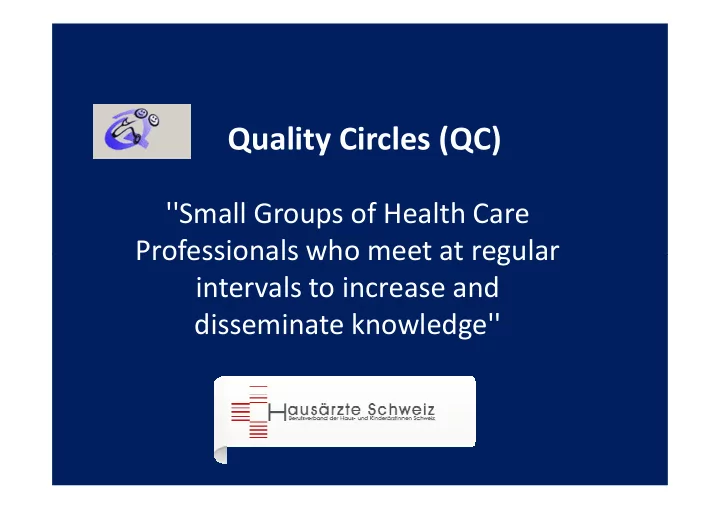

Quality Circles (QC) ''Small Groups of Health Care Professionals who meet at regular Professionals who meet at regular intervals to increase and disseminate knowledge''
Importance of the Phenomenon • Q Monitoring Results 2010 / 2012: – 80% of Family Physicians. Pediatricians and Specialists in Internal Medicine working in ambulatory care take part in QCs! • Swiss Association of Quality in Medicine (SAQM) 2013: • Swiss Association of Quality in Medicine (SAQM) 2013: – 55% of all Swiss Medical Societies recommend QCs – 35% of all of all Swiss Medical Societies have developed networks for QCs Other Organizations (State Associations = Kantonale Gesellschaften) : – 45% of all State Associations of Medicine recommend QCs – 14% of all State Associations of Medicine have developed networks for QCs
Do QC work? Components ''overall effect'' – Facilitation (Dogherty et al., 2010, Baskerville – Change in prescription et al., 2012) habits (Welschen 2004; Niquille, 2008 /2 010; Wensing, – Workshop (O‘Brian, 2001 ,Forsetlund, 2009) 2009; Bugnon, 2012) – Outreach visits (O‘Brian, 2007) – Change in test ordering (doctors become more – Audit and feedback (Ivers, 2012) specific) (Verstappen, 2003 and 2004)a/b – Use of local opinion leaders (Flodgren, 2011)
Workshop • Imagine Quality Circles who succeed! – Why do they work?
Workshop • Imagine Quality Circles who fail! – Why do they fail?
Thank you! You just helped med to find underlying theories… • Confirmation / validation of discussions with stakholders in Switzerland � Underlying theories
Data/Information/Knowledge Quality Circles Quality Circle SENSKY, T. 2002. Knowledge management. Advances in Psychiatric Treatment, 8 , 387-395. 7
What is Quality? The Level of Excellence of a Service • Aspects: – Structure – Structure – Process – Outcome
What is Quality? The Level of Excellence of a Service • Ethical aspects – Equity – Appropriateness
What is Quality? The Level of Excellence of a Service All users have their own preferences Quality is changing and part of a leraning system (history, culture, economy, science)
Quality Circles
«Complex» «Complex» (Medical Research Council, 2010) (Campbell, 2007) Intervention : QC System : Primary Health Care QCs have numerous and varying Constantly changing: • components Scientific progress • QCs take place in varying contexts • Social and cultural changes Social and cultural changes • • QCs target different QCs target different • (migration etc.) organizational levels Economic context • QCs work is not constant, • develops over time, probably showing a learning curve QCs take place inconsistently • over an uncertain period of time
Philosophies of Knowledge Positivism Positivism Realism Realism Constructivism Constructivism
Positivism There is valid knowledge (truth) only in scientific knowledge: Reports of sensory experience is the exclusive source of all knowledge: empirical evidence
Constructivism Constructivists maintain that scientific knowledge is constructed by scientists and not discovered from experiencing and knowledge of the world. Concepts of science are mental constructs proposed in order to explain sensory experience .
Realism Realism is regarded as the perspective between positivism and constructivism: it aims to explain knowledge through theories ''what works'' rather ''what works for whom and under what circumstances'' (Pawson, R. 2004, 2005, 2006)
Realist Interpretation of QCs • Causal power lies in the Mechanism • Whether the Mechanism is triggered depends on the Context • The Mechanism generates the Outcome!
How many people do you need to change a light bulb?
• It depends on the contex!!!
Realist Approach • Systematic Review: Aggregation of Data to reveal best solutions • Realist Review: Realist Review: Comparison of Mechanisms to develop theories explaining the programme
Research Questions How do the variations in Quality Circles influence the outcome? How do contextual features improve Quality Circles -individual and/or group performance? and/or group performance? What is the Prevalence of QCs in different states / European countries and how are they organised?
QCs could improve! • Realist comprehensive Review to find the appropriate contextual features and variations of the programme • Validate the results with stakeholders who provided Validate the results with stakeholders who provided us with theories • Test whether adjusted QCs work better – Before and after studies – Randomized controlled Cluster design • Survey in CH / Europe
HELP • Send me local literature • Send me local training material • Could you be available for an interview? Could you be available for an interview? • If you have an organisation for QC, I would like to get in touch with you/them!
adrian.rohrbasser@bluewin.ch Thank you!!! Thank you!!!
Recommend
More recommend